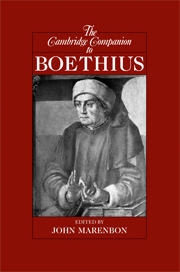Book contents
- Frontmatter
- Introduction: reading Boethius whole
- Part 1 Before the Consolation
- 1 Boethius’ life and the world of late antique philosophy
- 2 The Aristotelian commentator
- 3 The logical textbooks and their influence
- 4 Boethius on utterances, understanding and reality
- 5 The Opuscula sacra: Boethius and theology
- 6 The metaphysics of individuals in the Opuscula sacra
- 7 The medieval fortunes of the Opuscula sacra
- Part II The Consolation
- Appendix: Boethius’ works
- Bibliography
- Index: References to Boethius' works
- General Index
- Series list
2 - The Aristotelian commentator
from Part 1 - Before the Consolation
Published online by Cambridge University Press: 28 July 2009
- Frontmatter
- Introduction: reading Boethius whole
- Part 1 Before the Consolation
- 1 Boethius’ life and the world of late antique philosophy
- 2 The Aristotelian commentator
- 3 The logical textbooks and their influence
- 4 Boethius on utterances, understanding and reality
- 5 The Opuscula sacra: Boethius and theology
- 6 The metaphysics of individuals in the Opuscula sacra
- 7 The medieval fortunes of the Opuscula sacra
- Part II The Consolation
- Appendix: Boethius’ works
- Bibliography
- Index: References to Boethius' works
- General Index
- Series list
Summary
RAISON D’ ÊTRE AND EXTENT OF THE CORPUS
When conquered, Greece conquered her savage victor, and brought the arts to rustic Latium. Traces, however, remained of the rural past, and still remain, for only late did the Romans apply their minds to Greek writings.
In a famous passage Horace explains how the Roman conquest of the Greek world resulted in the refined Greek way of writing poetry conquering the rustic victors, though, he adds, there is still some rustic stink left because the speakers of Latin were rather late to pick up the Greek manners, starting only after the Punic wars.
In the first century BC, when Horace was still very young, Cicero, Varro and Lucretius had tried to introduce philosophy into Latium, but the impact of their work was very modest. Throughout antiquity philosophy remained a basically Greek affair. Some philosophers lived in the houses of Roman magnates or taught in Rome or other Latin-speaking parts of the empire, a few even had Latin as their mother tongue, but usually they would do their philosophizing in Greek, Seneca being the most notable exception.
Even though Cicero's generation did not start a great tradition for doing philosophy in Latin, it did, at least, make it possible for a Greekless Roman to get a good impression of some main aspects of Hellenistic philosophy. But in the second and third centuries AD a revolution took place in Greek philosophy which made the works of the Ciceronian age outdated.
- Type
- Chapter
- Information
- The Cambridge Companion to Boethius , pp. 34 - 55Publisher: Cambridge University PressPrint publication year: 2009
- 2
- Cited by



